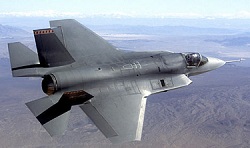In the Navy and the Marines, there’s no question that flying fighter off of carriers out in the salty seas has a pretty big impact on the plane’s ability in remain operational. We usually think that Air Force planes have it pretty easy by comparison.
Not so in the current war in Afghanistan.
In that environment, where the temperature on a flight line can get as high as 130 degrees and the humidity up to 80%, the heat takes an obvious toll on the machinery and the personnel working on them and flying them. The wind can offer some relief, but with that wind comes sand. And sand can get through even the smallest of openings in an aircraft system.
According to a recent article in Air Force Magazine, adding a heavier load to an aircraft in the form of external fuel tanks and ordinance only amplifies the effects of the elements on an F-15 or F-16.
 Sounds like we’re going to need those F-35’s pretty soon.
Sounds like we’re going to need those F-35’s pretty soon.
War is a pretty hostile environment any way you look at it, and doing it in these kinds of conditions takes a LOT of dedication. The Air Force squadrons in Afghanistan right now depend on maintenance workers working 24 hours a day, 7 days a week just to keep their aircraft running.
This is why I often stress the importance of teamwork. Remember that as a future officer and fighter pilot in the United States military, it will be your job to work with those who are maintaining your aircraft. Regardless of what service you’re in or what conditions you face, they will be looking to YOU when they have a problem.
Think of these tough times as opportunities. Opportunities to show the people under you’re command that you are concerned for their welfare. Give them your time and they will give you their trust. Then will you be able to guide them as true leader who truly knows his subordinates.
You may be working in a job right now where your co-workers think that the conditions are pretty harsh. Ask yourself what you can do to help motivate your team.
Leave a Reply